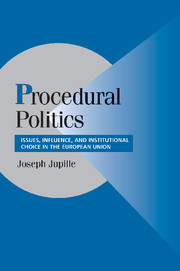Book contents
- Frontmatter
- Contents
- List of Figures
- List of Tables
- Preface and Acknowledgments
- List of Acronyms Used in the Text
- 1 INTRODUCTION: CHOICE, CONSTRAINT, AND EUROPEAN UNION INSTITUTIONS
- 2 THEORIZING PROCEDURAL POLITICS: ISSUES, INFLUENCE, AND INSTITUTIONAL CHOICE
- 3 THE EUROPEAN UNION AS A PROCEDURAL SYSTEM: RULES, PREFERENCES, AND STRATEGIC INTERACTION
- 4 PATTERNS: DETERMINANTS AND EFFECTS OF EU PROCEDURAL POLITICS
- 5 GREENING THE MARKET? PROCEDURAL POLITICS AND EU ENVIRONMENTAL POLICY
- 6 MAD COWS AND ENGLISHMEN: PROCEDURAL POLITICS AND EU AGRICULTURAL POLICY
- 7 CONCLUSION: PROCEDURAL POLITICS AND RULE GOVERNANCE IN THE EUROPEAN UNION AND BEYOND
- Bibliography
- Index
- Cambridge Cultural Social Studies
2 - THEORIZING PROCEDURAL POLITICS: ISSUES, INFLUENCE, AND INSTITUTIONAL CHOICE
Published online by Cambridge University Press: 24 July 2009
- Frontmatter
- Contents
- List of Figures
- List of Tables
- Preface and Acknowledgments
- List of Acronyms Used in the Text
- 1 INTRODUCTION: CHOICE, CONSTRAINT, AND EUROPEAN UNION INSTITUTIONS
- 2 THEORIZING PROCEDURAL POLITICS: ISSUES, INFLUENCE, AND INSTITUTIONAL CHOICE
- 3 THE EUROPEAN UNION AS A PROCEDURAL SYSTEM: RULES, PREFERENCES, AND STRATEGIC INTERACTION
- 4 PATTERNS: DETERMINANTS AND EFFECTS OF EU PROCEDURAL POLITICS
- 5 GREENING THE MARKET? PROCEDURAL POLITICS AND EU ENVIRONMENTAL POLICY
- 6 MAD COWS AND ENGLISHMEN: PROCEDURAL POLITICS AND EU AGRICULTURAL POLICY
- 7 CONCLUSION: PROCEDURAL POLITICS AND RULE GOVERNANCE IN THE EUROPEAN UNION AND BEYOND
- Bibliography
- Index
- Cambridge Cultural Social Studies
Summary
Because it draws its raison d'être from the proposition that institutions matter, institutionalism implies that actors – who presumably care about the outcomes that institutions generate – may face incentives to engage in politics with respect to, rather than simply within, rules. This possibility immediately presents institutional analysts with a dilemma, however, since for rules to be rules, they must not only represent objects of human creation or choice but also sources of human constraint. “A completely flexible [institutional] framework is a contradiction in terms” (Matthews 1986, 914). Clearly, rules are sometimes taken as fixed and given. But when will politics remain within a framework of rules, and when does it take place with respect to that framework? How will such politics unfold, and what will be their effects? This chapter addresses these questions, briefly laying out the conceptual premises of my argument and developing at greater length a theory of the conditions under which, the ways in which, and the effects with which actors engage in procedural politics. Although elaborated with reference to the EU, the theory applies quite generally to institutionalized political and social systems.
Generically, of course, rationalist statements about any behavior reduce to statements about preferences, opportunities, and constraints, or about relative costs and benefits. I do argue in the abstract that procedural politics responds to the opportunities for selecting alternative rules and to the net expected benefits of such institutional selection.
- Type
- Chapter
- Information
- Procedural PoliticsIssues, Influence, and Institutional Choice in the European Union, pp. 15 - 41Publisher: Cambridge University PressPrint publication year: 2004



